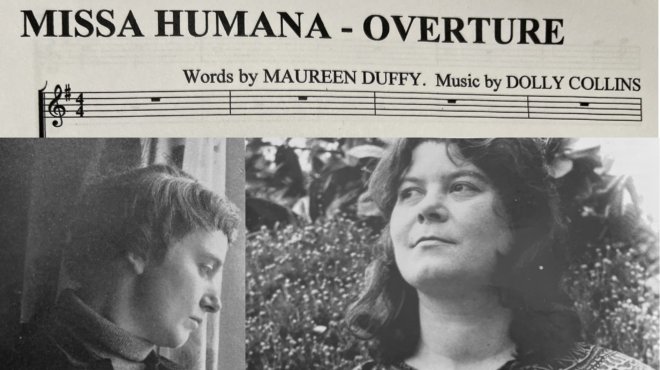‘Missa Humana’ World Premiere
25th February 2023 · 6:30pm - 8:00pm
Doors open: 6:00pm
In person

‘Now she lives in a cottage in Hastings, and is currently working on a full-scale secular Mass.’ Thus wrote the great folksinger Shirley Collins about her sister Dolly in the liner notes of the 1967 album The Power of the True Love Knot, which featured arrangements by Dolly, a student of the classical composer Alan Bush. The mass was ‘Missa Humana’, based on a poem by the celebrated London author Maureen Duffy, her longtime friend and collaborator.
In 2021, Maureen was interviewed by Lawrence Warner, a professor at her alma mater King’s College London, regarding her 1956 play based on the medieval poem Piers Plowman. Dolly, she related, had composed the songs for Pearson, but, Maureen said sadly, Dolly’s premature death in 1995 meant that she never heard her score for ‘Missa Humana’ performed.
A few days later, Lawrence happened to be chatting with another father at the school gates–the conductor John Andrews–about the 1980s mini-series First Born, based on Maureen’s 1981 novel Gor Saga. The conversation turned to the ‘Missa’: ‘That sounds very interesting. Can you get hold of the score?’
Lawrence tracked down Shirley (and her wonderful recent albums like Heart’s Ease), who put her old friend David Tibet, of Current 93, in touch with him. The only example of a recording of the ‘Missa Humana’ was made by David, who recorded Dolly playing, and singing, it on an upright piano at her home in Grantham in the early 90s when he visited her. This recording remains the only audio of Dolly—or anyone!—performing the Mass.
And now here we are, with John, ‘who conducts with grace and affection’ (The Telegraph), finally bringing Dolly’s and Maureen’s ‘Missa Humana’ to life for its world premiere, over fifty-five years after their collaboration on the piece began. Shirley and Maureen plan to offer a brief introduction at 6:30 p.m. When the music finishes ca. 8:00, attendees are welcome to have a drink in the foyer bar and to celebrate this historical landmark of the Hastings folk and London literary scenes.